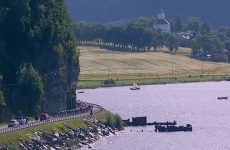Description
August 11, 2022
Arctic Race of Norway 2022– Stage 1 – Mo i Rana – Mo i Rana : 186,8 km
The Arctic Race of Norway is one of the youngest races on the cycling calendar and the only UCI sanctioned race to take place within the Arctic Circle,
Show more...
August 11, 2022
Arctic Race of Norway 2022– Stage 1 – Mo i Rana – Mo i Rana : 186,8 km
The Arctic Race of Norway is one of the youngest races on the cycling calendar and the only UCI sanctioned race to take place within the Arctic Circle, an area of the world that often sees temperatures dip below −34°C during the winter months! Thankfully, for the riders at least, the race takes place during the northern hemisphere summer when the temperatures are a little more favourable. Still, with inclement weather the norm in this race, it does tend to favour the gritty Classics specialists of the pro peloton.
Axel Zingle (Cofidis) surged away from the peloton in the final 150 metres to win the opening day of the Arctic Race of Norway.
Gleb Syritsa (Astana Qazaqstan) took second place in the fast, uphill sprint finish. Mathieu Burgaudeau (TotalEnergies) secured third at the line after a sharp turn and the gradient ended the chances of pure sprinters like Dylan Groenewegen (BikeExchange-Jayco).
Zingle will take the first leader’s jersey into stage 2 on Friday, which will provide another opportunity for the fast finishers. It was the second career victory for the 23-year-old Cofidis rider after success at the La Route Adélie de Vitré in the spring.
It was a soggy, windy stage 1 for the 186.8km journey around Mo i Rana, just south of the Arctic Circle.
The stage included two ascents of Korgfjellet, which was part of the race six years ago. The peloton would absorb a breakaway of five riders once it hit the finish circuits, two fullclaps of 10.5km each in Mo i Rana.
“I am so happy with this victory. Yesterday we went for a recon of the final and after that, in bed before sleeping, I was just thinking about today,” Zingle said at the finish.
“Generally, when I have this feeling of the final, I always do a good race, but it’s hard for positioning. I am proud I have done this.
“The finale there were two climbs and it was not very easy. So I knew in the last corner if I was in the top 10, I could do something great. but it was hard to get good position.
“I saw from the laps before the finish that you had to go up to the front very late because a lot of riders want to go in front and you have to be the last one to make a move.”
How it unfolded
With less than 20km covered, five riders struck out in the rain to lead the race: Stephen Bassett (Human Powered Health), Luis Ángel Maté (Euskatel-Euskadi), Aaron Van Poucke (Sport Vlaanderen-Baloise), Norwegian Eirik Lunder (Team Coop) and Sam Culverwell (Trinity).
Crossing the summit of Korgfjellet for the first time at the 47-kilometre mark, Bassett took the first mountains classification points for the race. He would also scoop up top points on the second climb too, with 98km to race.
Three intermediate sprints were provided in the second half of the stage, Culverwell taking the first sprint in Finneidfjord, ahead of Lunder and Van Poucke. The next pair of sprints were on the finishing circuit.
As the circuits approached, the breakaway’s gap dropped below a minute. Lunder and Maté were the first of the leaders to drop away. Any glimmer of hopes for the remaining trio were washed away with 24km to go.
Riders from Arkéa-Samsic and TotalEnergies pulled the mass of riders on the final kilometres to the finish, the heavy rain seeming to have tampened any eagerness for attacks, with a riding sprint widely expected.
Zingle waited until the final 150 metres to make his move, surging away to create a gap that could not be caught at the finish.
For his efforts, Zingle took honours as the best young rider and grabbed the early lead in the points classification. North American Bassett earned the mountains classification lead.
Results :












